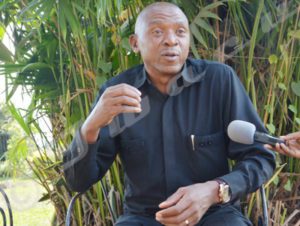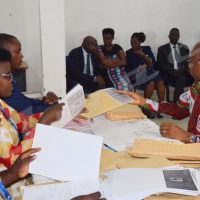Intimidations, persecution of his militants, his future,… Agathon Rwasa, First Vice –President of the Burundian Parliament does not mince his words. He also answers several other crucial and present-day questions.
Interview by Agnès Ndirubusa translated by Pierre Emmanuel Ngendakumana
 The commission of Inquiry on Burundi made a damning report on Burundi. What’s your reaction to it?
The commission of Inquiry on Burundi made a damning report on Burundi. What’s your reaction to it?
People are beaten up and some are imprisoned innocently. We witness cases of disappearances, bodies are found here and there, and perpetrators are not apprehended. This is a worrisome situation.
The victims, according to the report, are mainly members of FNL
Given the unjustified arrests made here and there, the fact that we are not allowed to express ourselves, meet our followers … are signs that do not deceive: They want to get rid of us. It is almost demonstrated that we are in a de facto single party system. And whoever does not rhyme with this system takes a heavy toll of it. I guess it should not be that way in the 21st century.
What is your reaction to the refusal of permission for MPs of Amizero y’abarundi coalition to hold a press conference?
They want to deny our existence. Every citizen has the right to express his/her opinions.
Do you have a total number of people who are imprisoned or intimidated?
From Mutimbuzi to Gisuru in Ruyigi eastern province, from south to the north of the country passing through the capital Bujumbura, cases of harassment are reported every week. It is a sad reality. There are people who behave as if they were above the law by ill-treating others and they end up going unpunished.
Can you give a recent example of these threats?
Almost ten days ago in rural Bujumbura, in the locality of Mageyo, there was a meeting of the ruling party CNDD-FDD. Someone among the heavyweight of the current government harangued the crowd for 45minutes and concluded saying that “Rwasa and all his sympathizers are to be tracked down.”
Are you not afraid that your sympathizers will run out of steam?
We are not running out of steam because there is persecution, otherwise we would have ceased to exist. We have been persecuted since 1980. It is not now that we must give in to fear. And beyond all this, it is one more demonstration that we are fighting for a good cause. We make a peaceful resistance. This reinvigorates us. It is true that there is a serious danger. All we know is that our struggle will end one day. And I fear that the negative attitude of some people towards us is rather a demonstration of despair as to their political survival.
Some people reproach you for not doing enough to secure your sympathizers?
I do neither command the army, the police, the national intelligence service nor the Imbonerakure -youth affiliated to the ruling party. Normally, security is the responsibility of the state. If the chief executive and his party decide on a given course of action, what can I do about it? People have to understand that I should not be judged. The regime in place should rather be judged. Rwasa is not persecuting his own followers. I have nothing to do with this. I speak out loud so that everyone’s rights should be respected.
What about the revision of the Constitution?
For Rwasa, it is not the revision of the Constitution that poses a problem. The problem is that the current president seeks to become “a president for life”.
He believes that Burundians rather need good governance, respect for rights, respect for “the word given”. He regrets that today, the regime manipulates people “by making believe that it is the will of the people when it is its own will.”
On the subject of political dialogue, he said, we must first accept that there is a crisis. One can then find solutions. He says “it is not Mkapa who will find a way out of this crisis”, but the Burundians themselves. We should set aside sectarianism and our selfish interests. “I think we can really get away with it. It is not too late. We have a right to optimism. This optimism can only be realistic if those in power understand that other Burundians also have rights in this country, “he concludes.
You are reproached for not creating a political party to conform to the law
The country has more than 40 political parties. What would be the added value of another party? The ruling party CNDD-FDD knows it was once in negotiations with the PALIPEHUTU FNL movement of which I was a leader.
They know very well it was with me that the agreement was signed. Today, the party in power does not want to recognize me as a member of FNL. Creating parties to please the government in place is not Rwasa’s temptation. CNDD-FDD is in a bad position, because it has sought to annihilate me but to no avail. We presented ourselves as independents in the 2015 elections and we were able to demonstrate our strength despite the circumstances. This disturbs them.
Do you think you represent a political force?
We are indeed a political force as the party is established throughout all the communes of the country. We are worth more than all these parties favored by CNDD-FDD. The ruling party should learn from those who exercised power before it. They had deployed all their energy to annihilate our movement. They did not succeed. Even CNDD-FDD will fail.
Only God knows what will happen to this party, once it is no longer in power. I fear that it will disappear completely as much as the Mpr in Congo or the Mrd in Rwanda. If the ruling party were clear-sighted, it would seek to open political space so that tomorrow, when it isn’t powerful anymore, it can gain some consideration from those in power.
You seem to be up in arms about CNDD-FDD?
CNDD-FDD seeks to press-gang everyone. Why does it recruit all citizens .It has just spent 12 years ruling the country. What was its assessment? The least we can say is that it has not been a positive record in all domains at all.
Nevertheless, you have joined the institutions. Do you regret it?
I cannot regret my decision. To what would have exile contributed, after all? If I were in exile, I would not meet you in Bujumbura (laughing). I mean that, despite the reduced space, we can meet people here, and exchange. At least we are in the country.
We can follow closely what is happening, hear what is said, see what happens and attest it. It is still better when one is at home even if there are still some setbacks.



















 IWACU Open Data
IWACU Open Data

